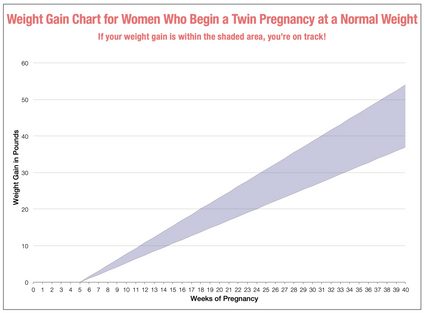Twin Pregnancy Weight Gain
The maternal weight gain in twin pregnancies has its own rules that are a bit different from singleton pregnancies. Let's find out how much weight you should gain every week, how to keep yourself healthy carrying two or multiple babies, and discover the most significant differences in pregnancy weight gain in different types of gestations.
💡 This article is a part of a bigger series, based on our pregnancy weight gain calculator.
We try our best to make our Omni Calculators as precise and reliable as possible. However, this tool can never replace a professional doctor's assessment. If any health condition bothers you, consult a physician.
Why do you gain weight during pregnancy?
Gestational weight gain is a must when it comes to pregnancy — your entire body is changing to support a baby growing inside of you. The amount of weight you gain depends not only on your baby's birth weight or the number of children you're carrying; all parts of your body need to adjust to this new situation:
- Your breasts and uterus both grow 2 lb.
- Your blood increases its volume by 50%.
- Your body accumulates water and starts producing amniotic fluid.
- A new organ is created — a 1.5 lb placenta!
If you're pregnant with twins, the situation's a little bit different. If all the babies have separate placenta, each one of them is on average 17% smaller. The difference grows to 24% in tripleton pregnancies. - A lot of extra fat tissue. It serves as a source of ingredients for pregnancy hormones production.
These values are usually different for singleton and twin pregnancies — women carrying twins and multiple pregnancies are expected to hold even more considerable weight.
Guidelines for twin pregnancy weight gain
As we've already mentioned in multiple articles, the expected weight gain during pregnancy depends on your pre-pregnancy weight and height, computed into BMI (body mass index):
As you may expect, these values are slightly higher for women with twin pregnancies. After all, you're carrying two souls under your heart! 👶👶
Here's the chart of weight gain recommendations for twin pregnancies:
- Underweight (BMI <18.5)
- Expected weight gain: 28–40 pounds (12.7–18.1 kg)
- Normal weight (BMI 18.5–24.9)
- Twin pregnancy expected weight gain: 37–54 pounds (16.8–24.5 kg)
- Overweight (BMI between 25 and 29.9)
- Twin pregnancy expected weight gain: 31–50 pounds (14–22.7 kg)
- Obese (BMI over 30)
- Twin pregnancy expected weight gain: 25–42 pounds (11.3–19 kg)
Some studies estimate that the weekly weight gain while pregnant with twins should be close to approximately 0.75 kg (1.5 lb) during pregnancy's second and third trimesters. However, every pregnancy and every woman is different — talk to your health care provider about your individual, healthy weight range.
Remember that excessive gestational weight gain may harm pregnancy outcomes! Weight gain during twin pregnancies is twice as significant. These gestations are already considered high risk or very high risk, depending on the chronicity, which is the number of placentas in the womb.
💡 Dichorionic (two placentas) twin pregnancies are the safest and most common type.
Possible threats for obese and overweight women include preterm birth (already increased in twins) and an even greater risk of preeclampsia.
What about low gestational weight?
Lower weight gain in twin pregnancies is associated with a higher incidence of low birth weight and an even greater risk of anemia.
→Check the birth weight percentile calculator to find out more.
More about pregnancy with twins or multiples
As we already know, an average woman gains around 30–50 pounds when pregnant with twins. What about multiple pregnancies? It is estimated that every additional fetus adds another 10 pounds (4.5 kg).
-
Normal-BMI women with twins should eat around 30–45 kcal/kg extra each day.
-
recommend increasing the daily intake by:
- 300 kcal per baby in the 1st semester;
- 340 kcal per baby in the 2nd semester; and
- 452 kcal per baby in the 3rd semester.
-
Keep a maternal weight gain record — step on a scale once a week at the same time of the day and write it all down.

-
It is essential to recognize multiple and singleton pregnancies early on. If you're pregnant with twins, but don't know it yet, you may needlessly worry about your "excessive" weight gain and try to impose some interventions that are not needed at all.
-
Try to exercise as long as you can — walk at least 150 minutes per week.
-
Fill your diet with proteins, vitamins, dairy products, and wholemeal products.
-
Maximize your calcium intake. Pregnancy may have a significant impact on your bones and teeth.
-
Increase your folic acid intake.